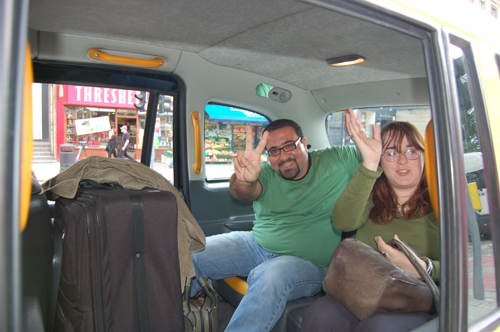The case began earlier this year with Ala Halihal, an Arab-Israeli or Israeli-Palestinian, seeking permission from the Israeli government to go to Lebanon to receive an award as winner of the “Beirut 39” literature competition. The event, which is awarding 39 Arab writers up to the age of 39, was developed as part of a UNESCO project. Essentially what happened was...
The author was informed that he had won the prize in August 2009 and immediately submitted a request to the Interior Ministry for permission to enter Lebanon. According to the 1948 Emergency Regulations, anyone wishing to enter an enemy country as defined in the Prevention of Infiltration Law must obtain a permit from the prime minister or minister of interior. Lebanon one of the countries classified as an enemy state.
Hlehel did not receive an answer from the Interior Ministry. Finally, in March, attorneys Hassan Jabareen and Haneen Naamnih, petitioned the High Court on his behalf.
The petitioners demanded that Hlehel be allowed to go to Beirut and that the state prepare clear and written regulations and criteria to determine what might qualify an Israeli wishing to visit the countries classified as “enemy” for a permit.
Perhaps, Israel's Interior Minister Eli Yishai and Prime Minister Benjamin Netanyahu in their world of black and white, felt justified, denying Halihal on the grounds of reciprocity.
The "accepted" view in the Arab world holds that a visit to Israel by an Arab author, artist or filmmaker is an act of treason, or at least a violation of the bylaws of professional associations. As a result, for example, the noted Egyptian author and playwright Ali Salem suffered the prolonged ostracism of his Egyptian author colleagues, who viewed his visit to Israel as a gesture of normalization.
Other Arab artists and writers who wish to visit Israel must do so surreptitiously to avoid the backlash.
Fortunately Halihal's appeal to the Israeli Supreme Court ended well, with a binding ruling that the state to explain why it had not established written regulations and criteria to objectively determine who was eligible to visit these 'enemy' countries and that Halihal must immediately be given a permit to visit Lebanon.
While the case seemed to have ended well, it certainly has raised a couple of important issues. First, as Haaretz notes:
And now none other than Israel, which has made normalization a precondition to the peace process and is demanding at least tiny gestures of normalization as a show of good intentions, has joined the coalition of the ignorant
While normalization with Palestinian artists has been tenuous as of late, it seems the current party line is beyond counter-productive. Nor does their hypocrisy help to inspire hope that such confidence-building would be treated in kind.
Secondly, and more fundamental is what an act like this, however small, means. Art can bring awareness to society and it is a powerful means of presenting truths about ourselves through such expression. There are many artists, and organizations who seek to promote tolerance and non-violence and to create a culture of peace through art. Amongst other things, perhaps this is something that Yishai and Netanyahu could better seek to learn.

Its a worthy cause.
1 comment:
Hello all,
Are you free on any of the following dates 21st -30th May? Yes, well you should get yourself down to the screening of the Salt of This Sea ‘ at the Cine Lumiere in London.
This is the first feature film by a Palestinian woman, Salt of This Sea tells the story of Soraya, a third-generation, working-class Palestinian refugee living in Brooklyn, New York. Soraya discovers that her grandfather’s savings have been frozen in a bank account in Jaffa since he was expelled in 1948. Determined to reclaim what is theirs, she fulfills her life-long dream to return to Palestine, but is rebuffed by the bank. It is then she meets Emad, a young Palestinian whose ambition, in contrast to hers, is to leave Palestine forever. Tired of the constraints that dictate their lives, Soraya and Emad know that in order to be free, they must take things into their own hands, even it means breaking the law...
Un Certain Regard Selection, Cannes Film Festival 2008
Palestinian Entry for the 2009 Oscars
The site for buying tickets is https://www.institut-francais.org.uk/book . Just look up Salt of This Sea and you'll find how to book tickets.
Check out the trailer
http://www.globalartscentral.com/?p=388
It would be great to see you there.
Post a Comment